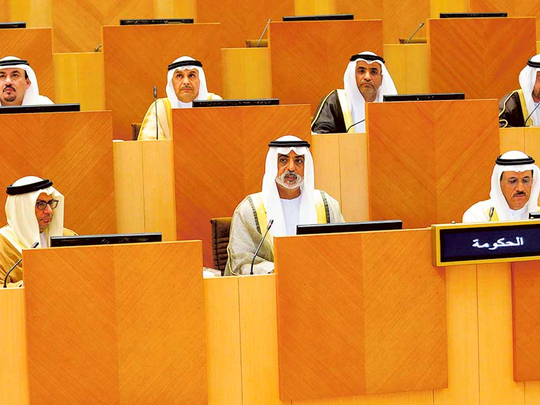
Gulf News: A new law will introduce tougher penalties of three years in jail and up to Dh10 million for those involved in fraud on and manipulation of the stock markets, Sultan Bin Saeed Al Mansouri, Minister of Economy, told the Federal National Council on Wednesday.
“The new rules, which require approval of the Cabinet and another law being issued by the UAE Central Bank, is meant to stamp out illegal margin buying, insider trading and other illegal practices on the stock exchanges,” said Al Mansouri, who is also Chairman of the UAE Securities and Commodities Authority.
Members of the FNC complained illegal margin buying and insider trading by certain brokers who possess information that is not available to other investors and use such knowledge to gain unfair advantage over the rest of the market have greatly damaged the investor confidence in the market.
The minister did not give a time frame as to when the law will be issued or take effect.
Ahmad Al Shamsi, a member from Ajman, demanded strict action be taken against market manipulators, saying that checking malpractices in the stock market has been ineffective.
“Unauthorised trading of stock exchange and using non-public information for making a trade violates transparency, which is the basis of a capital market. If one investor trades with non-public information, he or she gains an advantage that is impossible for the rest of the investors. This is not only unfair but disruptive to a properly functioning market.”
The Abu Dhabi Securities Exchange last month banned four traders from the market, but neither named them nor gave any reason for the ban.
Members of the House demanded an exchange court of arbitration be set up to settle disputes arising from trades on the regulated market and to stem irregularities on the markets.
The House called on the UAE’s Securities and Commodities Authority, the UAE market regulator to revise rules for managing investment and margin trading services to prevent any manipulation of stock prices.
In December, the UAE Central Bank discussed margin lending at a board meeting and ordered that all aspects covering commercial bank lending against shares be studied.
The Dubai stock index has swung wildly last year, soaring as much as 60 per cent and then giving up all those gains at one stage. Leveraged buying of stocks through margin trading at brokerages has sometimes fuelled speculative buying, FNC members told the Government.
Last month, the UAE’s Securities and Commodities Authority has urged brokerages extending margin trading services to obey regulations and sell clients’ shares if shortages in their accounts were not filled on time.
The House demanded that the market regulator effectively monitor brokers and ensure they abide by rules against money laundering and funding of terrorism.
Members of the House also demanded that administrative and logistics preparations be made to facilitate the merger of Abu Dhabi and Dubai stock markets and that time frame be set up for the merger.
They argued a potential merger between the two main stock exchanges of Dubai and Abu Dhabi would have many advantages for the country’s financial sector.
Al Mansouri said: “We hope there will be one market because as a regulator it would be easier to supervise. A merger might energise financial markets in the UAE, making it easier for investors to operate across the markets, stimulating trade and attracting more foreign investment,” the minister said.
The UAE has revived a proposal to merge its two main bourses in a state-backed deal that could boost trading and attract more foreign investment to the country.
Talks on a potential merger between the Dubai Financial Market (DFM) and the Abu Dhabi Securities Exchange (ADX) have occurred on and off since 2010.
The council suggested that the regulator enforce the customer service charter and set up a free toll telephone number to report complaints and suggestions.
The House also demanded the Government update policies and legislations to protect minority investors, register property and get credit (credit information), as required by the World Bank.
‘Doing Business 2015: Going Beyond Efficiency’ ranked the UAE among the 10 economies that have improved the most in performance on its indicators since the previous year.
“Protecting Minority Investors: The United Arab Emirates strengthened minority investor protections by introducing additional approval requirements for related-party transactions and greater requirements for disclosure of such transactions to the stock exchange; by introducing a requirement that interested directors be held liable in a related-party transaction that is unfair or constitutes a conflict of interest; and by making it possible for shareholders to inspect the documents pertaining to a related-party transaction, appoint auditors to inspect the transaction and request a rescission of the transaction if it should prove to be unfair,” the World Bank report stated.
Regionally, the UAE retained its first rank in the Arab and Gulf region for the second running year.
FNC members suggested disclosure policies of the stock markets be revised to make it obligatory for traders to disclose positions exceeding five per cent of the issued shares on a daily basis, instead of weekly at present.












